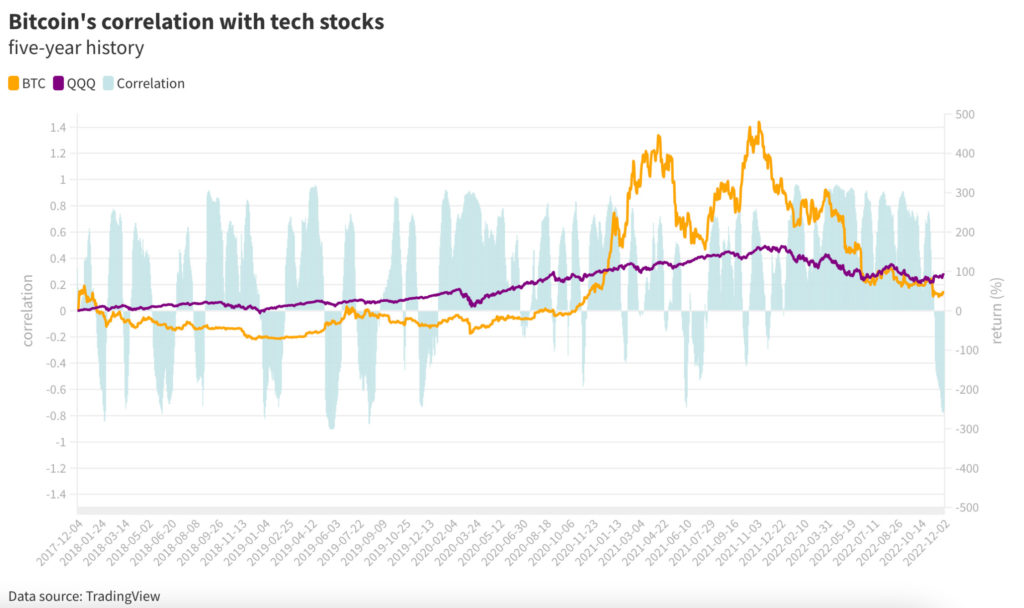Bitcoin, QQQ Correlation Dips to Lowest Level in More Than 2 Years

Bitcoin has decoupled from Investo’s QQQ Trust, suggesting the cryptocurrency’s days of trading virtually in tandem with Big Tech stocks may be in the past — at least for now.
Bitcoin’s 30-day correlation coefficient to QQQ, the tech-heavy ETF known as the Qs, dipped below -0.77, hovering at more than three-year lows set earlier this week, per TradingView data. A correlation coefficient of -1 would mean the assets are moving in complete opposite directions.
BTC’s 60-day coefficient is also negative but not as extreme, sitting at -0.2, its lowest point since last July. Blue-chip, growth technology stocks are expected to continue underperforming, according to Tom Essaye, founder of Sevens Report Research.
“Tech and growth stocks have recovered some ground on value recently, but we continue to believe that progress in the economic recovery and subsequently higher interest rates will be a headwind for tech, and a rotation from growth to value can be utilized to reduce tech overweights, but not abandon super-cap tech holdings altogether,” Essaye said.

QQQ is up 90% over the past five years, double bitcoin’s returns | Chart by David Canellis
The divergence comes as equities have dipped, following a stronger-than-anticipated jobs report, which showed nonfarm payrolls increasing by 263,000 in November. Analysts expected a 200,000 raise. Average hourly earnings also increased 0.6% between November and October and are up more than 5% year over year, suggesting the Fed’s efforts to curb inflation may not yet be sufficient.
The S&P 500 and Nasdaq Composite indexes were each trading about 0.5% lower halfway through Friday’s session. Bitcoin was largely flat, while ether rallied 0.4%. QQQ lost close to 1%.
Still, risk-off sentiment is likely to persist in the long run, analysts say.
“Crypto traders need to remember that a key reason why crypto has fallen so much over the past year is that inflation was out of control and central banks were motivated to send rates higher which ultimately was bad news for all risky assets,” Edward Moya, senior market analyst at Oanda, said in a note Friday.






 Bitcoin
Bitcoin  Ethereum
Ethereum  Tether
Tether  USDC
USDC  TRON
TRON  Dogecoin
Dogecoin  Cardano
Cardano  Bitcoin Cash
Bitcoin Cash  Chainlink
Chainlink  LEO Token
LEO Token  Zcash
Zcash  Monero
Monero  Stellar
Stellar  Litecoin
Litecoin  Hedera
Hedera  Dai
Dai  Cronos
Cronos  OKB
OKB  Tether Gold
Tether Gold  Ethereum Classic
Ethereum Classic  KuCoin
KuCoin  Gate
Gate  Algorand
Algorand  Cosmos Hub
Cosmos Hub  VeChain
VeChain  Tezos
Tezos  Dash
Dash  Stacks
Stacks  TrueUSD
TrueUSD  IOTA
IOTA  Basic Attention
Basic Attention  Decred
Decred  Theta Network
Theta Network  NEO
NEO  Synthetix
Synthetix  Qtum
Qtum  Ravencoin
Ravencoin  0x Protocol
0x Protocol  DigiByte
DigiByte  Zilliqa
Zilliqa  Nano
Nano  Siacoin
Siacoin  Numeraire
Numeraire  Waves
Waves  Ontology
Ontology  Enjin Coin
Enjin Coin  Status
Status  BUSD
BUSD  Hive
Hive  Pax Dollar
Pax Dollar  Lisk
Lisk  Steem
Steem  Huobi
Huobi  OMG Network
OMG Network  NEM
NEM  Bitcoin Gold
Bitcoin Gold  Augur
Augur  Ren
Ren